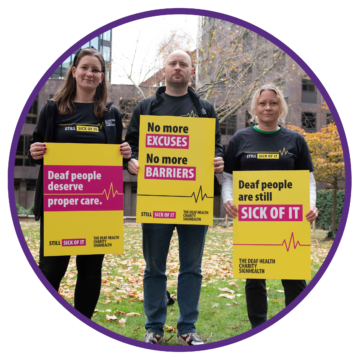Still Ignored: the fight for accessible healthcare
Research report introduction
More than 15 million adults in England are deaf or have hearing loss. Around 6 million adults in England have hearing loss severe enough that they would have difficulty in noisy environments, whilst an estimated 1 million would not be able to hear most conversational speech.
In addition, there are an estimated 73,000 deaf BSL users. Deaf BSL users often experience language deprivation at an early age, leading to difficulty understanding and using written English. As a result, many deaf BSL users face significant additional communication barriers.
Under the Equality Act 2010, health services like the NHS as well as social care services across the UK are required, by law, to make “reasonable adjustments” to remove barriers facing deaf people or people with hearing loss when accessing services, including providing information in an accessible format. For deaf people, a reasonable adjustment could include providing communication support, such as a qualified British Sign Language (BSL) interpreter.
Failure to make reasonable adjustments is classed as discrimination and is against the law. Health and social care services are also responsible for meeting the costs of any reasonable adjustments required.
The Equality Act
The Equality Act also makes it clear that under the Public Sector Equality Duty (PSED), NHS bodies must consider what’s likely to be needed in advance and not simply respond to individual requests as they emerge. There is therefore a clear and legally enforceable requirement for people who are deaf or have hearing loss to have their communication needs met when accessing NHS care. A failure to meet patients’ communication needs is a breach of the equality act.
The 2012 Health and Social Care Act empowered the government to publish information standards – setting out how the NHS processes information.
The Accessible Information Standard (AIS) took effect in 2016. The AIS ‘directs and defines a specific, consistent approach to identifying, recording, flagging, sharing and meeting the information and communication support needs of patients, service users, carers and parents, where those needs relate to a disability, impairment or sensory loss.’
In England, all providers of NHS or publicly-funded adult social care services should meet the legal requirements of the AIS. In this report, we have chosen to focus on access to NHS care.
In publishing the AIS, NHS England acknowledged that despite the Equality Act ‘many service users continue to receive information from health and social care organisations in formats which they are unable to understand and do not receive the support they need to communicate’.
Barriers to healthcare remain
In late 2021, a coalition of charities including RNID and SignHealth surveyed NHS and social care professionals in England, as well as disabled people who have accessible information and communication needs, about the AIS.
The findings indicated a lack of training, and a poor understanding of communication access as a patient right and of providers’ responsibility to follow the AIS. Poor implementation of the AIS was found to have serious practical, health and emotional consequences.
Building on this research, RNID have collaborated with SignHealth to improve and update our current evidence base on the barriers to accessing NHS healthcare for deaf people.
This report sets out the findings of this new research. It sheds light on the experiences of deaf patients, and the perspective of professionals who are working in the NHS and demonstrates that the NHS does not have the systems and processes in place to fulfil the right to accessible healthcare for deaf people.
The consequences can be devastating. People who are deaf avoid seeking NHS treatment, don’t understand the information they are given and, ultimately, feel unable to manage their own physical and mental health because of failures of the NHS to provide accessible healthcare.
Awareness of the key regulation amongst NHS staff is low, patient information isn’t being recorded and shared accurately, staff do not know how to access the information they need, or what action to take to ensure the needs of patients are met. The result is a system with too many barriers, undermining the ability of deaf people to access safe and effective treatment.
Together, RNID and SignHealth set out recommendations from this research in our policy report, Still Ignored: the fight for accessible healthcare which urges government to take note, grasp the opportunity and end the discrimination that deaf people face when accessing NHS services.

















